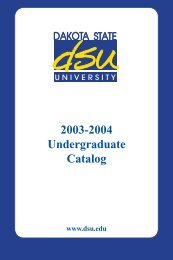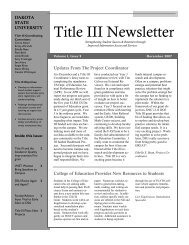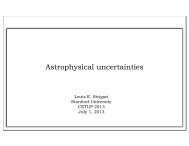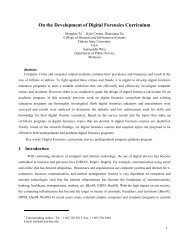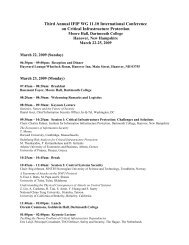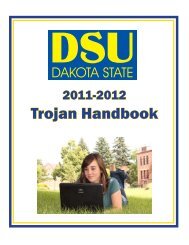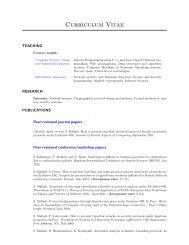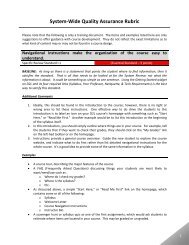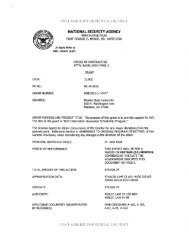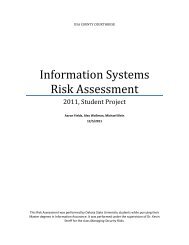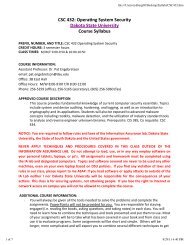Academic Calendar – Fall 2012 - Dakota State University
Academic Calendar – Fall 2012 - Dakota State University
Academic Calendar – Fall 2012 - Dakota State University
You also want an ePaper? Increase the reach of your titles
YUMPU automatically turns print PDFs into web optimized ePapers that Google loves.
Student Conduct Policies & Procedures<br />
meet in person with he code of conduct coordinator to review the issue and discuss corrective measures; make<br />
payment of a $50.00 fine before their connection can be restored.<br />
d. If, at any time during their enrollment at DSU, students commit a fourth offense, they will be referred to the Code<br />
of Conduct Board. The board has the authority to consider stiff penalties including fines, suspension or expulsion<br />
depending on circumstances.<br />
C. Interim Suspension<br />
In certain circumstances, the senior student affairs officer, or a designee, may impose an institutional or residence suspension<br />
prior to the hearing before a student conduct body.<br />
1. Interim suspension may be imposed only for one or more of the following purposes:<br />
a. To ensure the safety and well-being of members of the institutional community or preservation of institutional<br />
property or other property located on premises controlled by the institution;<br />
b. To ensure a student’s own physical or emotional safety and well-being; or<br />
c. To ensure the normal operations of the institution where a student poses a definite threat of disruption of or<br />
interference with the normal operations of the institution.<br />
2. During the interim suspension, students shall be denied access to residence facilities or to the campus (including classes)<br />
or all other institutional activities or privileges, in any combination or all together, for which the student might otherwise<br />
be eligible, as the senior student affairs officer or the student conduct officer may determine to be appropriate.<br />
3. Except in circumstances presenting an immediate threat to the safety and well-being of members of the institutional<br />
community, including the affected student, or in circumstances presenting an immediate threat of serious damage to<br />
institutional property or other property located on premises controlled by the institution, interim suspension may not be<br />
imposed until the student is afforded a reasonable opportunity to meet informally with the senior student affairs<br />
officer, or a designee, to learn the basis for the action and to raise any objections or to request leniency. The student<br />
should be notified beforehand of the purpose of the meeting. A student who fails to respond to the notice shall be deemed<br />
to have waived the right to such a meeting.<br />
D. Conduct sanctions shall not be made part of the student’s permanent academic record, but shall become part of the student’s<br />
confidential record. Sanctions that would be considered in the course of administering progressive conduct sanctions under<br />
section 3(B)(2) above shall be disclosed to another institution within the system if a student transfers to that institution or is<br />
required to appear there to respond to conduct allegations. Upon graduation, the student’s confidential record may be<br />
expunged of conduct actions other than residence expulsion, institutional suspension or institutional expulsion. Cases<br />
involving the imposition of sanctions other than residence expulsion, institutional suspension or institutional expulsion shall<br />
be expunged from the student’s confidential record six years after final disposition of the case or such other time as the<br />
student conduct officer may prescribe at the time of the expulsion. Where restitution is required of a student, the institution<br />
reserves the right to disclose all material portions of the confidential file as may be necessary to obtain a judgment in a court<br />
of competent jurisdiction. Such files as relate to matters involving restitutionary sanctions shall be preserved at least until all<br />
necessary sums have been paid.<br />
E. Students enrolled in a Board institution shall be held accountable for their conduct while visiting other Board institutions.<br />
students may be required, as a condition of continued enrollment, to report at their own expense to another campus to appear<br />
before a conduct hearing and to answer allegations based on their conduct while at that campus.<br />
1 Any conduct sanction imposed in response to campus or Board regulations shall be given systemwide effect. A student<br />
suspended at one institution shall not be able to enroll in the meantime at another. A student who has been expelled from<br />
one Board institution may not be enrolled at another.<br />
2. When a student is brought forward on conduct allegations by an institution, sanction shall be determined under local<br />
standards. This punishment/sanction may, at the discretion of local authorities and pursuant to local procedural<br />
regulations, include sanctions more severe than the minimum sanctions set forth in systemwide policy; except that no<br />
discretionary recommendation for suspension or expulsion may be imposed without the concurrence of the senior student<br />
affairs officer from the student’s home campus.<br />
F. Appeals<br />
1. A decision reached by the student conduct body or a sanction imposed by the student conduct officer pursuant to §<br />
3:4(3)(A)(7) may be appealed by accused students or complainants entitled to receive information concerning conduct<br />
sanctions under section (B) above, to an appellate board of the institution within five (5) week days, exclusive of<br />
holidays, after notice of the decision is sent. Such appeals shall be in writing and shall be delivered to the student<br />
conduct officer or his or her designee.<br />
2. Except as required to explain the basis of new evidence, an appeal shall be limited to review of the verbatim record of<br />
the initial hearing and supporting documents for one or more of the following purposes:<br />
a. To determine whether the original hearing was conducted fairly in light of the allegations and evidence presented,<br />
and in conformity with prescribed procedures;<br />
b. To determine whether the facts in the case were sufficient to establish that violation(s) of the Student Code occurred;<br />
c. To determine whether the sanction(s) imposed were appropriate for the violation of the Student Code which the<br />
49<br />
student was found to have committed.



